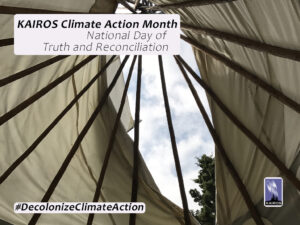The truth in Truth and Reconciliation

Truth and Reconciliation isn’t about living in or reliving the past. It’s about learning the truth of the past, looking within ourselves and accepting its truth, learning from it and moving forward from it.
For thousands of years, Indigenous peoples have preserved the foundation and connection with the environment; that connection is fundamental to the survival of their physical, social, economic, cultural and spiritual ways of life. The Earth provided and continues to provide for its inhabitants. The Indigenous people cared for their Mother and She cared and provided for her children.
Upon arrival on our shores, the settlers / colonizer’s lack of understanding viewed those already occupying the lands as savages and they deemed that the people didn’t utilize the rich lands properly. Simply because they lived differently, they were less than. It is unfortunate that this same mentality is alive today. This has resulted in Mother Earth being abused over the last couple hundred years, to the point of potentially destroying all that the Indigenous peoples worked so hard to maintain and nurture.
Non-Indigenous and Indigenous people have different explanations of what climate change is and its effects on us. It is difficult to define the issue within the colonial silos created based on those closed understandings of the crisis itself. Climate assessment reports rely on colonial knowledge. This perspective is from one direction, neglecting the overall and other vantage points. Traditional knowledge of the Indigenous peoples has rarely been considered as many still ignore Indigenous experience and expertise or view Indigenous persons as tokens.
Why is climate change existing? Simply put, it’s because of us! We have forgotten how to walk on Mother Earth. It is our severed relationship with our Mother that caused climate change. Fear instilled in the people by leaders without considering Indigenous views is causing the energy of Mother Earth to vibrate at a lower level.
The colonial systems collected Indigenous people and imposed the reservation system on them. Many Indigenous communities are greatly impacted by flooding, have no access to drinkable water, lack infrastructure and no road access. Access to the winter ice roads is decreasing significantly with a late freeze up and early thaw. Rising costs and impacts on food security add a greater threat to the state of the community. The seemingly simple comment of, “Why don’t they all just move?” is based in ignorance. Colonial structures placed them there and keep them there.
People around the globe will be affected to some extent by the impacts associated with climate change such as rising temperatures, changes in weather patterns and extreme weather events. However, due to a heavy dependence on the environment, their locations and economic situations, Indigenous communities will experience the effects of climate change in ways that most non-Indigenous people will not. Many Indigenous peoples globally, depend on the environment for subsistence, maintenance of culture, and other important aspects of their livelihoods. Since their ways of life are so closely tied to the land, Indigenous peoples must protect it.
Researchers don’t have the whole picture. Simply put, they don’t have the knowledge needed for pioneering and alternative solutions. Indigenous wisdom needs to be in the forefront and recognized as valuable knowledge. Indigenous people have had expertise with Mother Earth for thousands of years. Why would anyone disregard that “just because” that understanding comes from an Indigenous person?
Everything is about reconnecting and understanding what’s happening to the natural world together. Only then will we be able to respond to it appropriately, together. However, it’s my opinion, as an Indigenous man, that when a problem is defined differently, then the resulting solutions are also different. That outcome can only happen if different voices are heard.
By Connor Sarazin, KAIROS Blanket Exercise Communications & Partnerships Coordinator. Connor is a member of the Algonquins of Pikwàkanagàn First Nation.



